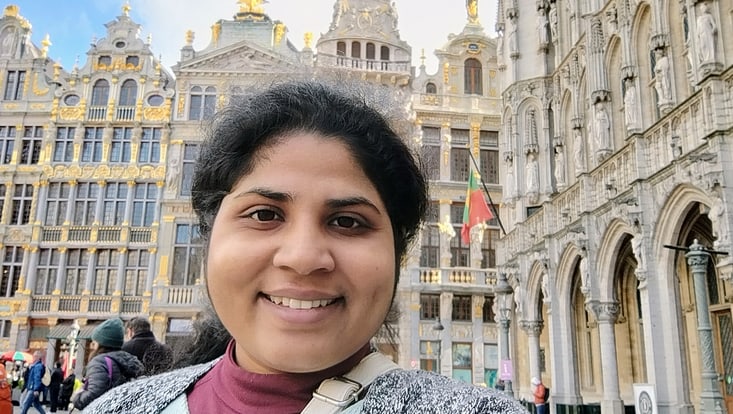MINGZ Funded Research Stay Abroad: Aiswarya in Belgium
18. März 2025

Foto: UHH/Pavanan
The MIN Graduate Center supports doctoral researchers by travel grants for conferences and research stays. The experiences on these trips are diverse and very interesting. Here is a report by Aiswarya Thazhissery Pavanans about her research stay in Belgium:
I was privileged to secure MINGZ funding for my research stay in Brussels, which was planned on short notice. The stay was hosted by my PhD co-supervisor, Prof. Wim Thiery, and his research group BCLIMATE at Vrije Universiteit Brussel (VUB), Belgium.
As a PhD student in Germany, I did not require a separate visa to visit Belgium. All I had to do was book my train tickets and arrange accommodation through Airbnb stay. Prof. Wim kindly took care of the remaining logistics needed for my work at the BCLIMATE lab, which made the transition seamless. Being an Indian visiting Europe for the first time, this was not only my first solo trip outside Germany but also my first experience traveling on German ICE trains. I was excited about these new experiences as well as the opportunity to engage with another university in Europe.
Meeting with the BCLIMATE research group
The BCLIMATE research group gave me a very warm welcome. It is part of the Water and Climate department at VUB and consists of several PhD and postdoc researchers enthusiastically working on extreme events, climate change impacts, energy meteorology, and land-atmosphere interactions. Prof. Wim, is climate scientist interested in modelling extreme events and carries out a lot of research on extreme event detection and attribution in various sectors. His group’s expertise with the ISIMIP (Inter-Sectoral Impact Model Intercomparison Project) models was the primary focus of my research stay, as I aimed to learn from their approach and apply it to my own research.
I was introduced to Derrick Muheki, a PhD student who investigates the hydroclimatic trends within the Congo basin using ISIMIP data. He helped me understand how the ISIMIP models function and guided me through their data repositories. We discussed ways to incorporate the ISIMIP framework se methods into my study on the impacts of extreme hot days on PISA test scores. This discussion provided a great starting point to explore how extreme weather attribution can be used to estimate the extent to which educational outcomes are affected by anthropogenic climate change. Derrick became a valuable collaborator.
Presenting face-to-face with experts
During my stay, I also had the opportunity to present my research at one of the group meetings. This platform provided me with extensive feedback and constructive questions that helped refine my regression models. The group suggested improvements, including new heat indices, advanced statistical methods, and machine learning techniques to address existing limitations in my analysis. With two data science experts in the group, I could quickly test these suggestions and receive feedback, which I consider the most significant advantage of this research stay. It was also my first introduction to machine learning regression techniques, which broadened my methodological toolkit.
Through this research stay, I gained three new collaborators, and learned new techniques that accelerated my work. I made the most of every opportunity to engage in in-person discussions with Prof. Wim on the crucial next steps of my research as well as with my collaborators, which deepened my understanding and enriched my research experience.
Exploring Brussels
Beyond research, I thoroughly enjoyed exploring the beautiful city of Brussels. My daily commute on trams were delightful, and I loved taking long walks through the city's charming cobbled streets and visiting the bustling city center. One of the most memorable highlights was trying Belgian waffles, a suggestion from a colleague in Hamburg that I truly appreciated. However, I found that the public transport in Brussels is way more expensive than in Hamburg.
Overall, this research stay was made possible by the MINGZ funding, and I am deeply grateful to the department for their support. I had an incredible experience with the welcoming people in Brussels, gained breakthrough insights for my research, and formed lasting collaborations. I look forward to securing more opportunities through MINGZ funding in the future.
